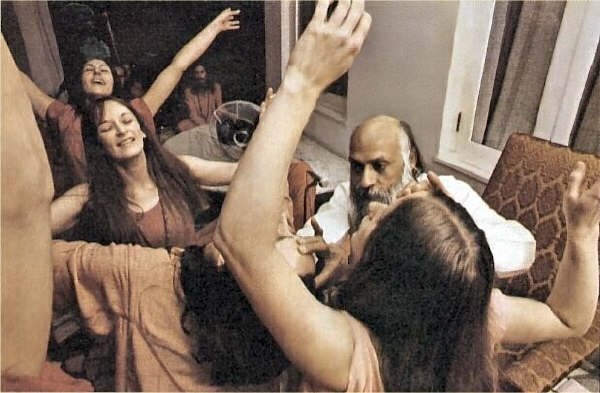Q: HAVING ATTAINED THE PEACEFUL STATE OF MIND WHICH YOU CALL INDIA, HOW CAN ONE SUSTAIN IT IN THE PRESSURES OF THE WEST? FOR ME, IT HAS BEEN IMPOSSIBLE.
Yes, I call India not a country, but an inner space. I call India not something that exists there in geography, on the maps. I call India that which exists hidden within you, and that which you have not yet discovered. India is your innermost space. India is not a nation, it is a state of mind.
The questioner asks,’Having attained the peaceful state of mind which you call India, how can one sustain it in the pressures of the West? For me, it has been impossible.’
Once you attain it, you cannot lose it. Even if you want to lose it, you cannot lose it.
No real attainment is ever lost. Then, you must have imagined that you had attained to the innermost peace. Then, you must have deceived yourself. Then, something must have given you the idea that you had attained to it.
For example, if you go to the Himalayas, it is peaceful and silent. Eternal silence reigns there. In that silence you start feeling silent you reflect silence. Don’t think that you have become silent; it is the Himalayas being reflected in you. The silence belongs to the Himalayas, not to you.
When you come down to the plains, that silence is gone. Again you are in the turmoil, again you ARE the turmoil, again the anguish and the anxiety. And you think you have lost something which you had gained? No, in the first place you had never gained it. It belonged to the Himalayas; it still belongs there.
You entered a certain situation, but you didn’t enter a certain state. The situation is something outside you, the state is something within you. And you deceived yourself. It is so easy to deceive oneself. One wants to feel that one has attained, because that also gives a very deep nourishment to the ego: I have attained.
Many people come to India. Coming from the West, India looks silent, peaceful, poor but contented. India is, in a way, almost two thousand years behind. When you come from New York to India, or from London to the Himalayas, you are moving backwards in time.
You are moving in the times of Jesus, two thousand years back. Everything is primitive, wild, untamed. One feels good; one feels again a certain freedom. The noise, the anxiety, the tension, the constant hurry, the ‘always going somewhere not knowing where one is going’ of the West, is not here. Things move slowly. Everything seems to be moving nowhere, very silently.
A certain music is still present. Indians may not feel it because they have been born to it, just as a fish never feels the ocean. But when people from the West come, they are shocked into a certain awareness. Their sleep is broken, and they start feeling and thinking that they have attained to a certain state.
To attain a certain state is not so easy. It is not a plane trip: you cannot fly from one state of mind to another state of mind. It is not a journey, it is a pilgrimage.
And this is the distinction between a journey and a pilgrimage: a journey is going from one point to another point in space, a pilgrimage is going from without to within, from space to no-space. You can be easily deceived here, not by anybody else, but by yourself.
Then you go back, and that freedom, that silence, that meditation, that prayerfulness, is lost. Hence the question:’Having attained the peaceful state of mind which you call India, how can one sustain it?’
There is no need to sustain it. It is so alive, it is so vital that it sustains itself. It has tremendous energy. It needs nobody’s help. In fact, you are not needed to sustain it; it sustains you. It is greater than you, higher than you, deeper than you, bigger than you: it is your original nature. It is you in your ultimate glory. Nothing is needed to sustain it, and nothing can distract you from it. Once attained, it is attained forever. You cannot lose it. If you lose it, then know well that you deceived yourself.
‘How can one sustain it in the pressures of the West?’ If it cannot be sustained in the pressures, it is not of worth. Any meditation that is of worth will be alive even in the marketplace. Because a marketplace is nothing once you attain to the meditative state. No market can disturb it, no market can distract you away from it. It becomes like breathing. In fact, you will feel it more in the marketplace than in the Himalayas, because in the Himalayas the contrast will be missing. If you have really tasted what aloneness is, you will feel it more in the crowd than on a Himalayan peak, because in the crowd, the contrast….
If you have listened to the inner music, you will hear it more in traffic noise because of the contrast. In the night you can see the stars in the sky, not in the day — because the contrast is missing. The night is so dark; in that velvety darkness you can see those stars, beautiful stars In the day they did appear. They are still there where they are, they have not gone anywhere, they remain in the sky — but the contrast is missing because of the sunlight. Now there is no background to them.
This, is my understanding, this is my experience: that whatsoever you attain, you will always taste it more, feel it more; it will surface in your being more clearly, crystal clear, whenever you move to the contrary. If the meditation is true, in New York it will be more clear to you, in London you will feel it more.
Surrounding yourself with the opposite, it will throb more clearly. If it is not happening, you come to the East, you feel good, and then you go to the West and it is gone. It has been a journey, not a pilgrimage. You travelled from one point to another in space, you have not travelled from space to no-space. Meditation means a pilgrimage from the out to the in, from the without to the within. Once attained, even if you want to lose it you cannot lose it.
OSHO
From : Come Follow To You, Vol 4 – Chapter #10


